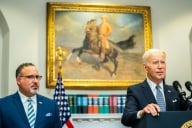You have /5 articles left.
Sign up for a free account or log in.
President Obama called for comprehensive immigration reform in a Las Vegas speech Tuesday afternoon, including several provisions that could affect American colleges and their students and graduates.
The president’s proposed framework for immigration reform joins a Senate proposal that a bipartisan group of eight senators announced Monday. The two proposals have much in common, including in areas relevant to higher education. Both call for expedited citizenship for undocumented immigrants brought to the U.S. as children, and both would make it easier for foreign citizens earning an advanced degree in science, technology, engineering or mathematics to get visas and green cards so they can stay in the country.
Obama’s proposal would give expedited citizenship to undocumented immigrants brought to the U.S. by their parents who are in college or have served in the military for at least two years -- a proposal that mimics the DREAM Act, stand-alone legislation that was long a goal of many advocates for young immigrants. Many of those immigrants already have permission to work in the United States as a result of the president’s deferred action program, which allowed them to legally work and avoid deportation but does not provide a path to citizenship.
The Senate framework for principles of immigration reform used similar language, but didn’t specify that immigrants be in college or the military in order to benefit. Under both proposals, undocumented immigrants would be required to pay fines and back taxes, pass a background check and wait longer for green cards than legal immigrants do in order to gain permanent residency or citizenship. Students eligible for deferred action have already taken some of those steps, and it’s unclear what their paths to citizenship would entail.
In his speech, Obama named a College of Southern Nevada sophomore who was one of the first beneficiaries of deferred action. “We need Congress to act -- and not just on the DREAM Act,” he said, but on comprehensive immigration reform.
Another section of the proposal would expand visas for workers with advanced degrees in science, engineering, technology or mathematics by automatically granting a green card upon graduation for graduates of “qualified U.S. universities” — a term it doesn't define — who have found a job in the U.S. The employers of those immigrants would pay a fee to support domestic science education.
Microsoft had lobbied for such a plan this fall, according to the National Journal. The company’s plan called for expanding the visas for highly skilled workers, known as H-1B visas, and charging employers $10,000 per visa. The money would go to expanding science education.
While the House of Representatives voted on a STEM visa bill in December, the White House opposed the bill because of an unrelated provision.
Higher education associations praised the White House and Congress’s action on putting forward proposals, but said that more information was needed to judge the ideas fully.
“AAU is quite encouraged by the action under way at the White House, in the Senate, and the soon-to-be action in the House of Representatives,” Amy Scott, associate vice president for federal relations at the Association of American Universities, wrote in an e-mail to Inside Higher Ed. Key questions remain on the STEM visas, she said, such as whether all employers (including potentially universities) will be required to pay the fee and what the fee will be.
Another group, NAFSA: Association of International Educators, praised the president’s plan. “The president spoke eloquently about the need to make more citizenship and work opportunities available to the thousands of bright and talented foreign students now enrolled in U.S. colleges and universities,” the association said in a statement.
Comprehensive immigration reform seemed out of reach until just after last fall's elections, but many advocates now believe a federal compromise is achievable. The Senate and White House plans showed some areas of agreement, and the House of Representatives is said to be working on a plan of its own. Obama urged Congress to act on immigration soon and not get "bogged down in an endless debate."








